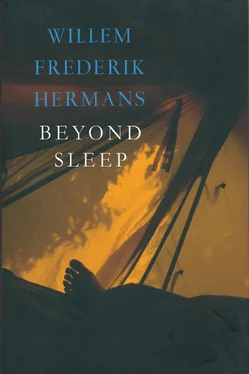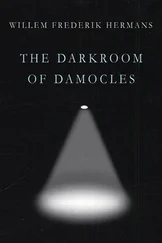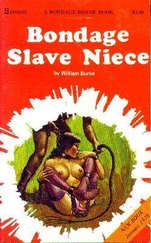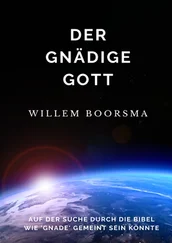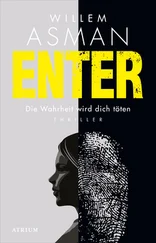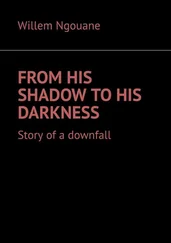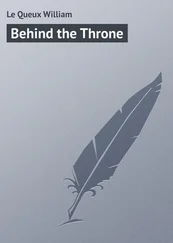‘By doing his duty, the incomprehensible duty imposed on him by his incomprehensible existence in an incomprehensible world. The same goes for the rest of us.’
‘That’s the penalty for being incapable of doing truly creative work.’
‘You’re an optimist! Do you think the difference is really that big? Every intellectual profession consists for the most part in making laborious preparations to carry out operations that are quintessentially simple. Like frying an egg on top of Mount Everest.’
‘You reckon? The telescope was invented by someone who looked through two magnifying glasses, one held to his eye and the other at arm’s length. And it was a spectacular invention!’
‘But in those days you couldn’t go out and buy a magnifying glass from the local optician. You had to begin by grinding your own lenses. There’s the rub.’
There’s the rub indeed, and I help myself to another handful of raisins.
*
‘Being a student,’ Arne says, ‘means labouring under a gross delusion. You feel you’re making progress. Read one book after another. Sit for exams. Obtain diplomas. Intellectual advance, you think. The certificates are there for you to take home and show around. Parties are thrown to celebrate your success. Everything and everyone tells you you’re making progress as long as you pass exams. I knew a student once who framed his certificates and hung them on the wall. And then what do you do? Once you’ve got the degree? It’s back to doing your own lens-grinding. Or lugging a forty-kilo rucksack around for days on end. Or sleeping on wet ground in wet clothes. I’m sorry about that. It’s all my fault. I should have bought a new tent. Qvigstad and Mikkelsen are high and dry, no leaks in their tent. But, believe me, setting out with a brand new tent and then returning without a major discovery — I don’t think I could stand it. I do apologise. It’s not fair on you. Just a silly notion of mine. All the same, if it all turns out to have been for nothing, if you don’t find what you’re looking for, at least you’ll be able to say: I made the effort, I did my best, it isn’t as if I didn’t try. Forgive me. I’m terribly sorry.’
He mutters ‘terribly sorry’ a few more times, lies back with his arm under his head and begins to snore again.
It’s as if he hasn’t been fully awake. An instance of sleepwalking, or rather sleep-talking. But now he is undeniably sound asleep.
I wish I could sleep too.
Instead, I’m wide awake with fear. Imagine going home at the end of the summer having achieved nothing! Nothing but the satisfaction of having made the effort and done my best.
What could Arne have meant by what he said just now? With the rain pouring down and him talking in his sleep, didn’t it sound as if he was telling my future, complete with offers of consolation, absolution even?
Bad omen? Arne’s the only one I feel at all close to. It would have been worse coming from Qvigstad.
Qvigstad bites into the world with big white teeth. Swings his hammer like a god. Leaps across rivers unhampered by the heaviest of loads. When he stops to take in the views all around It’s as if he’s surveying his own property. Fish rise to the bait the moment he casts his line. I have yet to see Arne catch an edible fish with his aluminium saucepan wrapped round with nylon fishing line.
He’s no less tough than Qvigstad, though. Maybe tougher. Maybe Qvigstad wouldn’t be up to hiking in derelict boots or sharing leaky tents with swarms of mosquitoes. Maybe Qvigstad wouldn’t get any sleep at all in those circumstances, whereas Arne is well away and snoring. When the water drips onto his face his eyelid merely twitches.
The drumming of the rain drowns in the howling wind. It is so dusky in the tent that It’s impossible to tell how far we are into the day.
The rain persists, and there is no sign of it lifting.
The four of us sit together in Qvigstad and Mikkelsen’s tent, in the centre of which the primus stove is burning. Arne and I hold our sleeping bags aloft in the vain hope of getting them dry, manoeuvring awkwardly to avoid singeing. To think that Arne insisted I change into dry socks after I slipped in the river the first day. Now both of us are soaked to the skin, and our clothes won’t dry until we get a few days of continuous sunshine. Sopping wet socks and shoes. Sopping wet sleeping bags with the down clotted into lumps of putty. Mikkelsen has a thermometer. He says it’s three degrees Celsius outside.
Patches of moisture begin to spread around where Arne and I are sitting. Qvigstad and Mikkelsen regard us with dismay, as if we’ re a pair of cats rescued from a well. Their belongings are arranged in meticulous order. Their boots have been placed outside the tent in protective plastic bags, under the projecting eave of the double roof. Their feet are shod in Lapp slippers of soft leather to spare the groundsheet. Stray insects are dispatched with spray the moment they appear, after which their corpses are neatly swept into little heaps.
We take turns going outside armed with six sheets of toilet paper and the folding spade. It’s the only way.
With my mac over my head, and the sides held out wide to avoid soiling, I take a shit in the pouring rain — standing. My injured leg is too stiff for me to squat. The surface of the lake looks like beaten pewter. Last night’s reindeer are nowhere to be seen. I listen carefully, but can only make out the sound of the wind and the rain. Where can the animals have gone? There’s nowhere for them to shelter. They’ll be soaked to the skin like me, and I’ ll have to be stoical like them. The mosquitoes attack my buttocks, my thighs. I pull the cotton wool off my forehead and bury it with the rest under sodden moss. When I’ve pulled up my trousers I find I can wring streams of water from my shirt tails. Warm water, heated up by my body.
Naturally the primus can’t be kept going for ever. Especially not now, because unless the rain lets up soon we’ re going to have to do all our cooking with paraffin. Where would we get paraffin once we’ ve used up what little we have?
Moreover: even if the weather improves, how long will it be before the dwarf spruces are dry enough to use for firewood?
For all I know it could rain like this for a week, or a fortnight. I don’t dare ask Qvigstad how much fuel we have left, but it won’t be very much. If we can’t make fires we’ll have to exist on bread, knäckebröd and tinned food. We won’t even be able to make coffee. And how long is our supply of bread supposed to last?
All these things go through my mind without panic, more with amusement. My only worry is that we might be forced to go all the way back to Skoganvarre to wait for better weather. But that hasn’t even been hinted at. Qvigstad gets to his feet and Mikkelsen turns off the primus. They put on their rainproof clothes, hang their map pockets round their necks, kneel down, unfasten the tent flap, reach for their boots, take them out of their plastic bags, put the dripping bags outside again, and so forth. Everything they do is methodical. Clouds of insects rush in as the pair of them leave. Arne closes the flap behind them. I expect him to reach for the mosquito spray, but the idea doesn’t seem even to enter his head.
‘I don’t fancy spending all day in here,’ I say. ‘There’s no point.’
‘No, there isn’t.’
Several mosquitoes have burrowed into my hair and are stinging my scalp.
‘Come on, then,’ I say.
‘Do you mind if I take a look at your leg?’
‘Oh no, please don’t. It’s fine.’
I roll over onto my stomach and crawl outside dragging my bad leg behind me, which I do with some difficulty.
By six in the evening I have covered a distance of at least ten kilometres in the rain. You end up not noticing the rain any more than you notice how wet you are when you’ re swimming. The intensity varies, as does the gradient of the terrain, as does everything else. Sometimes It’s as good as dry for periods lasting up to twenty minutes.
Читать дальше
